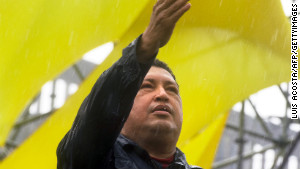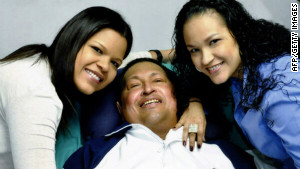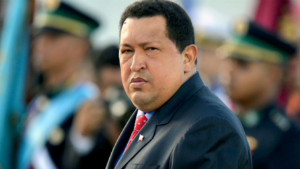(CNN) -- Venezuela expelled two U.S. Embassy officials on Tuesday as it accused domestic and foreign enemies of "attacking" ailing President Hugo Chavez.
Venezuelan Vice President Nicolas Maduro accused a U.S. Embassy attaché of seeking military support for a plot against the government.
David Delmonaco, an Air Force attache for the U.S. Embassy in Caracas, was expelled Tuesday "for being implicated in conspiratorial plans," the country's information ministry said.
Venezuelan Foreign Minister Elias Jaua said a second U.S. Embassy staffer had been declared "persona non grata" and would be expelled within 24 hours.
Opinion: Time to respect Venezuela's democracy?
Delmonaco is on his way back to the United States, Pentagon spokesman Lt. Col. Todd Breasseale said after Maduro's announcement.
A senior Obama administration official told CNN that the United States "denies the charge that the air attache, or anyone else in our embassy or the U.S. government, was plotting against the Venezuelan government."
After announcing the expulsion of the attaché, Maduro -- addressing the media in a lengthy statement -- charged that someday, there will be "scientific proof" that Chavez, fighting a battle with cancer, was somehow infected by outsiders. He also called Venezuela's political right-wing an "oligarchy" and an "enemy of the nation."
The vice president urged supporters to close ranks and exercise "unity and discipline."
Maduro's comments came after he met with the country's top officials Tuesday about Chavez's worsening health condition. These are "most difficult moments we have experienced" since Chavez's surgery on December 11, he said.
The country's top leadership -- 20 state governors, Cabinet ministers, the military high command -- were all in attendance at the meeting and news conference, raising speculation that a big announcement was imminent.
Political opponents of Chavez's government have stepped up their demands for more information on the president's health in recent days. The government has said Chavez is "fighting for his life" and has an infection and respiratory problems, and he has not been seen or heard from publicly in nearly three months.
Maduro said a more detailed report on the president's condition is forthcoming.
 Hugo Chavez's 'bleak' diagnosis
Hugo Chavez's 'bleak' diagnosis  Chavez health reports spark controversy
Chavez health reports spark controversy  Hugo Chavez's health worsens
Hugo Chavez's health worsens Chavez first announced he had cancer in 2011. He spent more than two months in treatment in Cuba recently, returning to Venezuela two weeks ago. Maduro said Chavez's health is in a "complicated situation" and the government has been transparent about his respiratory problems.
Since Chavez underwent surgery in December, government accounts about his health have been vague. The last glimpse Venezuelans had of their leader was last month when the government released a series of photographs that showed a smiling Chavez -- his face bloated -- lying on a blue pillow, flanked by his two daughters.
On Monday, Information Minister Ernesto Villegas said Chavez was battling a new infection and that his breathing problems had worsened.
"There is a worsening of the respiratory function, related to the state of his depressed immune system," Villegas said, reading an official statement on state-run VTV.
He reported Chavez is battling a new and "severe" infection, stressing that his overall condition remains "very delicate." Chavez is undergoing chemotherapy and other treatments, he said.
"The president continues to hold fast to Christ and to life, aware of the difficulties he's facing," Villegas said.
The president began chemotherapy after his fourth cancer surgery in Cuba in December, and he is continuing the "intense" treatment at a military hospital in Caracas, according to Maduro.
It was Chavez's decision to return to his country from Cuba to resume the post-operative treatment, Maduro said Tuesday.
{ 0 comments... read them below or add one }
Post a Comment